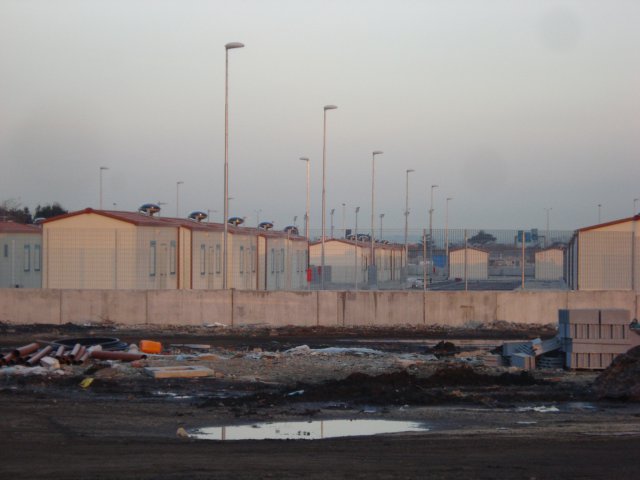Italy: Municipality of Rome Denies Social Housing to Roma Living in Formal Camps
27 February 2013
 Rome, 27 February 2013: Romani families living in formal camps in Rome will not be able to gain access to social housing, according to new guidance from the local authorities. Scores of families had already filed their applications and many more were about to do so, when news of the discriminatory new guidance emerged.
Rome, 27 February 2013: Romani families living in formal camps in Rome will not be able to gain access to social housing, according to new guidance from the local authorities. Scores of families had already filed their applications and many more were about to do so, when news of the discriminatory new guidance emerged.
Rights groups Amnesty International, Associazione 21 Luglio, the European Roma Rights Centre (ERRC) and the Open Society Foundations (OSF) sent a letter today to the local authorities in Rome. The letter highlights that the recently adopted policies on housing, which prevent Romani families from escaping segregated formal camps in the city, breach international and EU legislation and represent a new low in discrimination against Roma in the country. The groups are also calling on the new national government to act immediately to end this discrimination.
Social housing in Rome is allocated with a points-based system. In recent weeks, Romani families who live in formal camps in Rome have been told by Rome’s authorities they cannot receive the points they need to give them a concrete chance to access social housing, as they are already living in ‘permanent structures’.
Roma living in formal camps are segregated from the rest of the city, often far from basic services. The distance from the centre makes it difficult to get to school or find work. Almost all camps are fenced in and monitored by cameras and guards. Segregated camps, which offer no chance of integration or social inclusion, are the most noticeable results of Rome's "Nomad Plan". The authorities of Rome have continued with this widely discredited approach, despite the fact that Italy’s ‘nomad emergency’ was declared unlawful by the Council of State, Italy’s highest administrative court, in November 2011.
Roma living in camps were previously excluded from access to social housing in Rome, because of the requirements for applying and criteria for allocation of housing units. The criterion which has until recently triggered the assignation of social housing in Rome was lawful eviction from private accommodation – a situation which does not apply under current legislation to Romani families living in camps. This situation seemed to change when, on 31 December 2012, a new Public Notice was published by the municipality of Rome, saying that the maximum score (category A1) would be granted to those in "greatly disadvantaged housing conditions", including families living "in centres, public dormitories or any other appropriate structures temporarily provided by entities, institutions and recognised and authorised charitable organisations dedicated to public assistance".
This move was welcomed by Romani families living in formal camps and NGOs working to end discrimination against Roma in Italy. The housing and living conditions of Romani families residing in formal camps seemed to match precisely those described in Category A1 of the public notice. However, the city authorities swiftly moved to prevent Roma from being able to take up their rights to social housing.
An internal circular was issued on 18 January by the Municipality of Rome, saying that "nomad camps" cannot be considered as matching the situation described in Category A1, as they should be regarded as "permanent structures". Category A1 is the top priority category which gives the highest number of points to the applicant and offers the only concrete possibility of being assigned housing, in the current context of a severe social housing shortage in Rome.
Yet the very same authorities repeatedly said in past years - and in several official documents - that Roma in Rome are not segregated because they are not indefinitely confined to camps, where they are merely offered temporary accommodation. This hypocritical stance is a clear attempt to deter Romani families living in formal camps from applying for social housing.
National and international NGOs are deeply concerned that Roma in Rome continue to be ethnically segregated in formal camps, the only places where they have been offered housing. The end of such segregation can only be achieved if Romani families living in camps are allowed equal access without discrimination to other forms of housing, including social housing.
These NGOs are calling on the authorities of Rome authorities to withdraw these measures and give access to social housing to Roma living in formal camps on equal terms as provided to others living in similar circumstances. They are also asking the new national government to address this situation with urgency, and calling on European institutions to raise their voice against these blatant breaches of EU anti-discrimination law.
For more information, contact:
Amnesty International – International Press Office
Phone : +44 (0) 20 7413 5566 (9:30 - 17:00 GMT Monday-Friday)
Phone : +44 (0) 777 847 2126 (Line open 24 hours a day)
Fax: +44 (0) 20 7413 5835
press@amnesty.org
Associazione 21 Luglio – Press Office
Phone: +39 06 64491242
stampa@21luglio.org
European Roma Rights Centre – Media and Communications Officer
Sinan Gökçen
Phone: +36 30 500 1324
sinan.gokcen@errc.org
Open Society Foundations – European Communication Office
Eleanor Kelly
Phone: +44 (0) 207 031 1719
Fax: + 44 (0) 207 031 0201
Eleanor.Kelly@opensocietyfoundations.org




